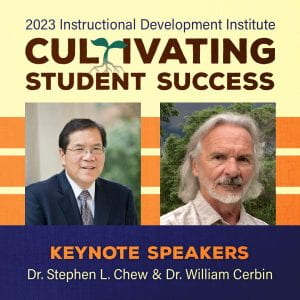On January 10, 2023, we gathered virtually for the annual Instructional Development Institute hosted by CATL and the Instructional Development Council. This year included attendance and presentations by educators from UWGB, UW System, K-12 schools, and the private sector for the 2023 Instructional Development Institute: Cultivating Student Success. The conference was a huge success, with over 140 in attendance for our keynote session and strong momentum throughout the rest of the day. In this blog post, we will reflect on the Institute and share teaching resources, materials, and takeaways from this year’s Institute.
Keynote & Workshop Leaders
 This year’s IDI included two keynote speakers, Dr. Stephen L. Chew, 2011 Carnegie Professor of the Year and 2018 recipient of the American Psychological Association’s national award for distinguished teaching, and Dr. Bill Cerbin, the founding director of the Center for Advancing Teaching and Learning at UW-La Crosse and a nationally recognized expert on lesson study and the scholarship of teaching and learning. Dr. Stephen and Dr. Cerbin’s keynote and workshop presentations explore the nine main cognitive challenges of student learning and how we, as educators, can address each of these nine challenges to better support our students.
This year’s IDI included two keynote speakers, Dr. Stephen L. Chew, 2011 Carnegie Professor of the Year and 2018 recipient of the American Psychological Association’s national award for distinguished teaching, and Dr. Bill Cerbin, the founding director of the Center for Advancing Teaching and Learning at UW-La Crosse and a nationally recognized expert on lesson study and the scholarship of teaching and learning. Dr. Stephen and Dr. Cerbin’s keynote and workshop presentations explore the nine main cognitive challenges of student learning and how we, as educators, can address each of these nine challenges to better support our students.
For those that were enrolled in the 2023 IDI Canvas course, we encourage you to watch the recording of the keynote and both keynote workshops to learn more about the cognitive challenges students experience and ways educators can address these challenges. In addition to the keynote presentations, Dr. Bill Cerbin has created a self-paced, self-directed, ungraded Canvas course, Cognitive Challenges of Lectur IDI Canvas course. The Cognitive Challenges of Lectures course expands upon the keynote’s research and presentation and provides instructors with tangible takeaways to improve student learning and success. The 2023 IDI Canvas course is now closed.
Want to learn more from our keynote speakers?
Presentations, Roundtables, and Panels on Student Success
The theme this year was centered on “Cultivating Student Success,” and presentations highlighted the many ways all university community members support the success of students. Sessions throughout the day covered topics such as using universal design for learning (UDL), information literacy, fostering growth mindset in high-tech classrooms, best practices for handling hot-button topics in the classroom, and reflections on student internship experiences.
UWGB Library Resources to Help Students Evaluate Website Credibility
The session, “Teaching Students to Evaluate Website Credibility” led by three members of the UW-Green Bay Libraries’ team, Jodi Pierre, Renee Ettinger, and Carli Reinecke included a demonstration on lateral reading and additional resources for instructors teaching an FYS or a research focused course to help students identify credible websites for their research purposes.
Instructors can use the resources available through the UWGB Libraries FYS Integration Kits which include pre-built learning objects, lesson plans, and simple assignments that can be integrated into their courses to support a variety of information literacy learning outcomes. Additional resources provided are the Civic Online Reasoning website which provides lesson plans, assessments, and videos on evaluating online information as well as the SIFT framework used to evaluate websites. As a reminder, UW-Green Bay libraries offer a wide range of research and information literacy resources, including library instruction for your classes.
Reflective Learning Resources
The session, “Inner Tracking: A Reflective Practice for Holistic Learning” led by David Voelker included a discussion on implementing written reflective learning practices for students that help students reflect on how their learning is affecting them as a person. An additional resource from this session includes the Inner Tracking exercise which instructors can incorporate into their course.
How to Build Community in the University Workplace
The IDI hosted a special podcast episode of Psychology & Stuff, “How to Build Community” with co-hosts Ryan Martin and Georjeanna Wilson-Doenges. In this thought-provoking discussion, Ryan and Georjeanna discuss approaches to creating meaningful connections and building community among university staff in higher education. Watch the recording to learn more as Psychology & Stuff hosts apply research and principles from urban planning and environmental psychology to the building of community in our workplaces and learning communities
Resources for Using Universal Design for Learning (UDL)
The session, “Using Universal Design (UDL) to Create Access and Increase Student Success,” led by Lynn Niemi and Alison Gates provided a useful hand-out for instructors to use in their instruction for Further Resources for Universal Access Design for Learning.
Wrap-up & Conclusion
This year’s Institute was a huge success, and we thank everyone who attended our teaching and learning conference and supported all our thoughtful presenters. The presentations and conversations throughout the day offered us some important themes, which CATL director Kris Vespia shares in the wrap-up of the day, that we can take into the spring semester. One is the importance of empathy and perspective-taking, as throughout the day we were asked to put ourselves in a student’s shoes and struggle to understand in new learning contexts. Another theme of the day focused on the importance of communities, whether that is in the classroom to create inclusive environments or building communities amongst faculty and staff. The communities we build in higher education will directly affect students’ paths to success in individual courses and in their educational endeavors. We hope to see you at the 2024 Instructional Development Institute!


